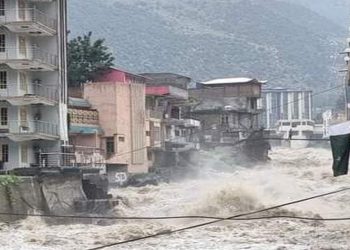You may have heard that some doctors nationally or internationally use music or recitation of Qur’an to treat their patients. This method of treating with sounds is nothing new. Traditional healers of ancient times were aware of sound effects and have used them for healing. You may have heard that music and recitation of the Qur’an have radically different but significant effects on water.
According to modern science, the waves created by what we say and their effects remain in the air for a long time and such devices are being explored, which can re-hear words spoken in the recent past by separating them from air or any other medium or substance.
The purpose of this long introduction was to make people think that words are very important. Not just that the apparent meanings of spoken and written words are very important, but also the occasion, the context, the accent and the style are important, and so are the effects of every written word and the consequent consequences.
Therefore, whenever a text is read or a speech is heard, all these factors have to be kept in mind. Mere and single words do not tell the whole story. Who said it, when did he/she say it, where did he/she say it, in what tone did he/she say it? It is important to know and understand all these factors.
It is our misfortune that as individuals and as a society we have not yet adopted a logical way of thinking and reasoning. Most of our conversations are ambiguous, meaningless, pointless and pointless. Because of our frivolous approach to words, it is more irrational and vain to talk about any scientific, logical and real issues in our society today.
If you have a scholarly conversation with someone or ask them to read a text, disgust is evident from their faces and attitudes, but if you talk nonsense or pointless drama, the party stays for hours. Running a country is not the work of a lazy slave, nor can this subject demand and tolerate any ridicule. But here it seems that politics and state has also become a third class stage drama of Lahore’s Al-Hamra or Naz Theater.
Just days before, Mr Shabbar Zaidi, the former head of the Federal Bureau of Revenue, which is the lifeblood of Pakistan’s economy, states that Pakistan at the moment, is bankrupt. This statement is important not only because of its choice of words but also because it is said by Shabbar Zaidi, a former head of a very important federal institution in Pakistan and an economist.
The same thing would not have mattered if Umar Sharif (late) or Moin Akhtar (late) had said it. Similarly, Shabbar Zaidi’s statement came at a time when the Tabdeeli government has completed three-fourths of its five-year term. The statement becomes more important if you look at the claims of this government for the last 42 months.
Because throughout this period, the government has been pursuing the principles of eliminating corruption, transparency and austerity, moving the economy out of crisis, eliminating trade deficits, repaying large amounts of foreign debt and increasing exports, foreign investment and remittances from overseas Pakistanis.
If the statements of the government including the Prime Minister of Pakistan were accepted as correct then the country should have stood on its own feet, but on the contrary a developing country has gone bankrupt.
This is a terrible thing that requires serious thought and revolutionary change in the country’s system and administrative structure. Zaidi’s statement has shocked the entire country. Almost all quarters, including the opposition to the government and the real rulers of this country, have remained silent on this statement.
And in this atmosphere of indifference, the voice of the Prime Minister’s Adviser on Trade and Investment, in which he not only repeated Shabar Zaidi’s statement word for word, but also went a step further and said that the situation is so bad that there is no hope of any foreign investment in the country now.
This statement would not have been taken seriously if it had come from the leader of an opposition party, but even this statement by the Prime Minister’s Adviser on Trade and Investment went unnoticed by the ruling circles, and so far there has been no serious reaction from the government or official level.
These statements by Shabar Zaidi and Razzaq Dawood would have far more lethal implications than this irresponsible statement of Aviation Minister Sarwar Khan about PIA pilots. Certainly these statements of Shabar Zaidi and Razzaq Dawood are alarm bells for the Pakistani economy and state.
If such statements had been made by a government official in a civilized country, the government and the state would have announced emergency measures by now, meetings of national security agencies would have been held, the Prime Minister would have given up all engagements and sat down with the economic team to consider the consequences of these statements and to plan and prepare to deal with the potential catastrophic effects.
But on the contrary, if you look at the news and analysis on the activities of the Pakistani government, the Prime Minister, the ministers and the media even today, you will find that no one realizes the seriousness of these statements, taking notice of them is a matter of distance.



























